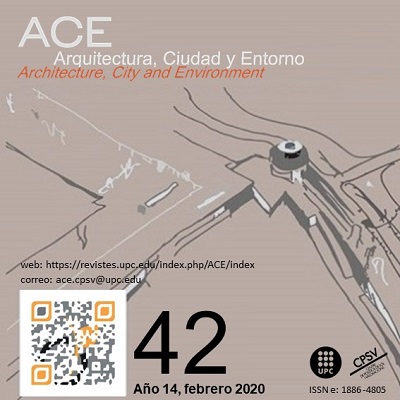Dynamic scopes. How tectonics gives way to agencements
DOI:
https://doi.org/10.5821/ace.14.42.8288Keywords:
Contemporary architecture, tectonics, dynamicsAbstract
From a dynamic perspective of reality, this research aimes to determine how tectonics of architectural space gives way to spatial processes that give dynamic characteristics to architecture.This research begins with a reference documentation that tracks the concept of tectonics in architecture from its etymology and its applications in contemporary reality. This study serves as a frame of reference for the study of cases, which allow to identify -in those architectures- the dynamic characteristics due to the agencements. After the analysis of cases, in relation to the conditions revealed by the positions on contemporary reality, it is evident how tectonics give way to agents that take control of certain tectonic components, and how the production of the architectural work is under emerging-process conditions. Thus, these architectures show indeterminacy, instability, uncertainty, deformation, ambivalence, processes and/or emergency in their constitution. Actions that point to the generation of an architecture whose tectonics accommodate agencements that allow, from an interdisciplinary approach, to permeate other processes, experiences and effects on architecture.The contribution of this article is to venture into a different way of understanding architecture that begins to break out with tectonic precepts to immerse itself in dynamic fields, granting to architecture indeterminate, unstable, imprecise, deformable, ambivalent, procedural and emerging conditions.Downloads
Published
Issue
Section
License
| INTELECTUAL PROTECTION CRITERIA |
At this moment, it is count with the "Oficina Española de Patentes y Marcas", while global protection it is being processed by the World Intelectual Property Organization (OMPI/WIPO). Nevertheless the International Standard Serial Number Office (ISSN) has given the following numbers ISSN: 1886-4805 (electronic version) and 1887-7052 (paper version). All articles will be peer reviewed, using double blind reviewing. |
| COPYRIGHT |
The article contents and their comments are authors exclusive liability, and do not reflect necessarily the journal editor commitee's opinion. All ACE published works are subject to the following licence CC BY-NC-ND 3.0 ES http://creativecommons.org/licenses/by-nc-nd/3.0/es/ It implies that authors do not hold nor retain the copyright without restrictions but only those included in the licence. |


































